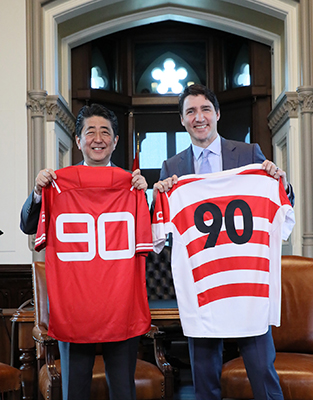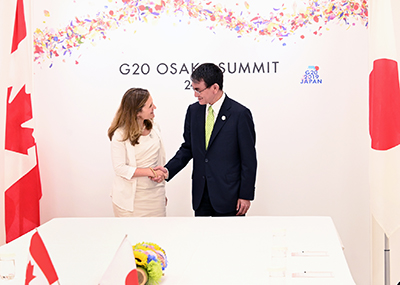Diplomatic Bluebook 2020
Chapter 2
Japan's Foreign Policy that Takes a Panoramic Perspective of the World Map
2 Canada
(1) Situation of Canada
In the House of Commons election in October that called into question the public evaluation of the Trudeau administration, although the ruling Liberal Party led by Prime Minister Trudeau lost seats and its working majority, it secured its position as the top party and the second Trudeau administration began. Ms. Freeland, who served as Minister of Foreign Affairs during the first administration, became Deputy Prime Minister and Minister of Intergovernmental Affairs. Mr. Champagne, who served as Minister of International Trade during the first Trudeau administration, assumed the position of Minister of Foreign Affairs.
On the diplomatic front, in addition to areas that Canada has placed importance on until now such as U.S.-Canada relations, the UN, the North Atlantic Treaty Organization (NATO), the G7, the G20, and the Organization of American States (OAS), the Trudeau administration is also strengthening participation in the Indo-Pacific region. In April, at the Japan-Canada Summit Meeting during Prime Minister Abe's visit to Canada, it was agreed that Japan and Canada would strengthen their strategic partnership under the vision of FOIP, and Prime Minister Trudeau announced a two-year extension of the deployment of ships by Canada for monitoring and surveillance activities against illegal maritime activities, including ship-to-ship transfers with North Korean-flagged vessels. On the other hand, in terms of Canada-China relations, no progress was seen in the case of the detention of two Canadian citizens by the Government of China following the arrest of the Chief Financial Officer (CFO) of Huawei by the Government of Canada based on a request from the Government of the U.S. at the end of 2018. This continues to be a major challenge for Canada.
On the economic front, the growth rate is decelerating, although Canada achieved a high rate of economic growth due to the effects of the strong U.S. economy in 2017, and due to effects such as the unclear global economic situation. The second Trudeau administration inaugurated in November has promised to work on economic policies for the middle class such as tax reductions and expansion of the child care benefit and unemployment benefits, as well as active climate change policies. On the diplomatic front, the administration is continuing to promote free trade policies, concluded the USMCA, and is working on strengthening relations with Asia-Pacific countries.
(2) Japan-Canada Relations
Japan and Canada are important partners for each other in the Indo-Pacific region. As G7 members, the two countries also cooperate closely in a wide range of fields including politics, economy, security, and people-to-people exchanges. 2019, the 90th anniversary of the opening of Canada's legation in Tokyo, was a year in which bilateral relations deepened further through frequent mutual visits by dignitaries, security and economic cooperation, and more.
At the summit level, Prime Minister Abe held a summit meeting with Prime Minister Trudeau during his visit to Canada in April. Then Prime Minister Trudeau visited Japan during the G20 Osaka Summit in June. A Summit Meeting was also held in August taking the opportunity of the G7 Summit in Biarritz. At the foreign ministerial level, foreign ministers' meetings were held between Foreign Minister Kono and Foreign Minister Freeland during the G20 Osaka Summit in June and the ASEAN-related foreign ministers' meetings held in Bangkok in August. Foreign Minister Champagne, immediately after assuming his position, attended the G20 Aichi-Nagoya Foreign Ministers' Meeting held in November in Nagoya. Through such frequent opportunities at a high level, Japan and Canada coordinate their recognitions of various regional and international issues including North Korean affairs, and closely cooperate with each other.
 The leaders of Japan and Canada exchanging uniforms of their national rugby teams
The leaders of Japan and Canada exchanging uniforms of their national rugby teams (April 28, Ottawa, Canada; Photo: Cabinet Public Relations Office)
 Japan-Canada Foreign Ministers' Meeting (June 29, Osaka)
Japan-Canada Foreign Ministers' Meeting (June 29, Osaka)On the security front, the Japan-Canada Acquisition and Cross-Servicing Agreement (ACSA) entered into force in July. In addition, Japan and Canada are closely cooperating to respond with monitoring and surveillance activities against illicit maritime activities, including ship-to-ship transfers with North Korean-flagged vessels. Japan and Canada are also promoting exchanges between their forces, such as implementation of a joint exercise by the Maritime Self-Defense Force and the Royal Canadian Navy in waters near Viet Nam in June following on from 2017. Furthermore, Minister of National Defence Sajjan made the first visit to Japan in 13 years in June, as Canadian defence minister, during which they affirmed their intention to raise the bilateral defence relationship to a new level. Thus, 2019 marked a year in which Japan-Canada cooperation in the security sector heightened concretely and strategically.
On the economic front, one year has passed since the entry into force of the Comprehensive and Progressive Agreement for the Trans-Pacific Partnership (TPP11) signed by eleven countries including Japan and Canada, and trade and investment relations are expected to deepen further. Cooperation in the energy sector, including exports of liquefied petroleum gas (LPG) in June from the West Coast of Canada to Japan and other Asian countries progressed further. In December, the 29th Meeting of the Japan-Canada Joint Economic Committee was held in Toronto, and there were discussions regarding international trade conditions and priority cooperation sectors.
